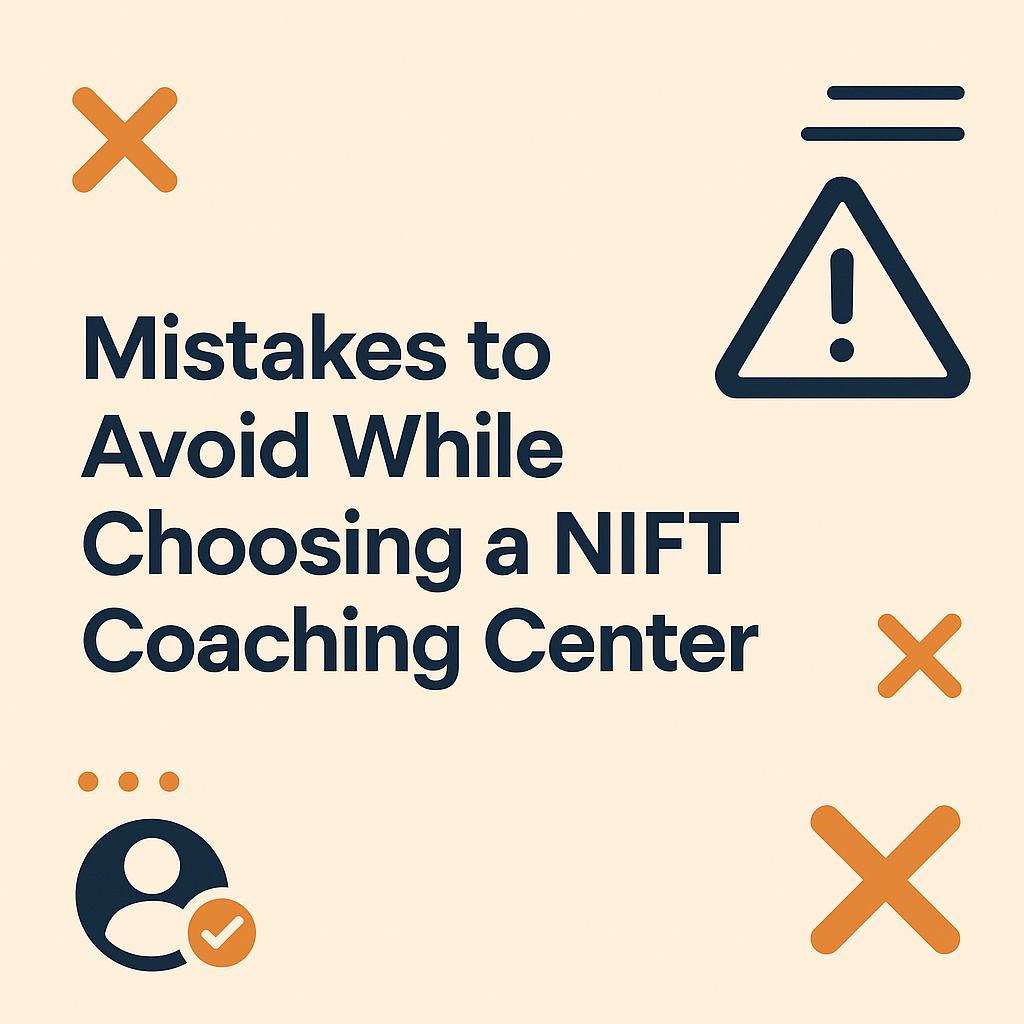Choosing the right NIFT Coaching can dramatically impact your chances of success in the highly competitive NIFT Entrance Exam. Yet, many aspirants make critical errors in their selection—causing stress, time loss, or ineffective prep. Here’s a deep dive into the most frequent mistakes and how to avoid them:
1. Overlooking Faculty Expertise & Credentials
Mistake: Opting for coaching centers without evaluating instructor credentials—especially whether they’re experienced NIFT or design professionals.
Why it matters: Expert faculty understand exam nuances. Centres with under-qualified or ex-students-as-teachers often fail to deliver targeted guidance.
🔍 Tip: Look for centers with mentors who are NIFT alumni, designers, or seasoned educators with proven results. Check portfolios, success stories, and ask directly during demo sessions.
2. Neglecting Quality and Up-to-Date Study Material
Mistake: Choosing coaching based on brand name without verifying the relevance and currency of the provided materials.
Why it matters: NIFT evolves; outdated study material fails to reflect the latest CAT, GAT, or Situation Test formats.
✅ Tip: Ensure that your NIFT Coaching includes updated study material aligned with the latest exam syllabus—covering creative ability, general ability, aptitude, and studio test modules.
3. Skipping Mock Tests or Time-bound Practice
Mistake: Relying only on theory or sketch practice without frequent mock testing under timed conditions.
Why it matters: Without simulated exam practice, aspirants struggle with time pressure, result analysis, and performance tracking.
🛠 Tip: Look for coaching centers that offer a structured mock test schedule (CAT, GAT, Situation Test), with performance evaluation and improvement tracking.
4. Ignoring Situation Test Preparation Approach
Mistake: Underestimating the Situation Test or not verifying how a center handles this section.
Why it matters: The Situation Test is vital for B.Des admissions. A coaching center that lacks proper material kits, workshops, or timed practice leaves students unprepared.
🧱 Tip: Choose a center offering hands-on studio sessions, structured briefs, and mock situation tasks. Ask whether they provide material kits, group critique, and detailed feedback.
5. Picking a Coaching Center Solely on Location or Cost
Mistake: Selecting a center just because it’s close or cheapest available.
Why it matters: Convenience doesn’t equate to quality. And low-cost centers often compromise on infrastructure, faculty, or personalized attention.
💡 Tip: While logistics matter, prioritize value—from mock tests and mentorship to updated material. Compare offerings across institutes rather than only fees.
6. Ignoring Batch Size & Personalized Attention
Mistake: Enrolling in classes with huge batches where students receive little individual feedback.
Why it matters: Personalized critique—especially for creatives—matters far more than general lectures. Large batches can dilute focus.
🎯 Tip: Prioritize coaching that limits batch size or offers one-on-one mentor sessions. Ensure regular doubt-clearing and direct faculty access.
7. Relying Exclusively on Testimonials Without Verified Feedback
Mistake: Basing decisions solely on marketing claims or coach-driven success stories.
Why it matters: Some institutes exaggerate their success rates or use paid testimonials. Genuine experiences may differ.
👂 Tip: Seek feedback from independent forums or past students—not just official testimonials. Look for real ranking stories, honest negatives, and peer insight.
8. Failing to Compare Online vs Offline Coaching Models
Mistake: Picking an offline center without considering online alternatives—or vice versa.
Why it matters: Each model has pros and cons—offline coaching offers hands-on studio access, while online is flexible but may lack in-person guidance.
📚 Tip: Choose based on your lifestyle. Hybrid models—online theory + weekend studio workshops—often combine the strengths of both.
9. No Strategic Plan or Timeline in Coaching
Mistake: Joining coaching without understanding their course timeline or failing to follow a personal strategy.
Why it matters: Coaching can be ineffective if sessions lack structure or oversight. Without strategy, aspirants waste time on irrelevant tasks.
📅 Tip: Seek coaching that enforces a clear timeline: concept-building → sectional practice → mock test cycles → situation drills. Your coaching plan should dovetail with your personal study calendar.
10. Underestimating Soft Skills, Portfolio & Interview Prep
Mistake: Assuming NIFT Coaching focuses only on sketches and ignoring portfolio or PI guidance (especially relevant for M.Des or postgraduate applicants).
Why it matters: Written test is only the first step—final admissions often depend on portfolio presentation and interview skills. Without coaching support, you might falter in those rounds.
🗣 Tip: Confirm whether the coaching institute provides support for portfolio curation, mock interviews, and communication skills training.
🎯 Summary: Avoid These Common Mistakes
| Mistake | Smarter Alternative |
| Ignoring faculty credentials | Verify experienced, qualified mentors |
| Using outdated or generic study material | Choose updated, exam-aligned resources |
| Skipping mock tests/practice | Ensure regular timed mocks with performance feedback |
| Ignoring Situation Test prep | Confirm structured studio exercises and materials |
| Choosing on convenience or cost only | Focus on value delivered—not just price or location |
| Large batch classes | Opt for small cohorts or one-on-one mentoring |
| Blind faith in testimonials | Check independent reviews or student forums |
| Not comparing online vs offline | Pick format that suits your schedule and learning style |
| Lacking strategy/timeline | Seek coaching with planned roadmap and milestones |
| Missing soft skills/portfolio prep | Ensure portfolio/interview guidance is included |
✨ Final Thoughts
NIFT Coaching should be more than just a brand—it must provide purposeful direction, expert mentorship, updated study resources, realistic mock testing, and creative feedback. Avoid the trap of impulse decisions based on hype or low costs. Instead, choose a program that builds your skills—in building, sketching, general aptitude, and presentation.
Whether you pursue classroom training or NIFT Online Coaching, focus on consistent strategy and deliberate practice. If you’d like help comparing specific centers, reviewing their curriculum, fee structures, or test sessions, I’m happy to assist.




